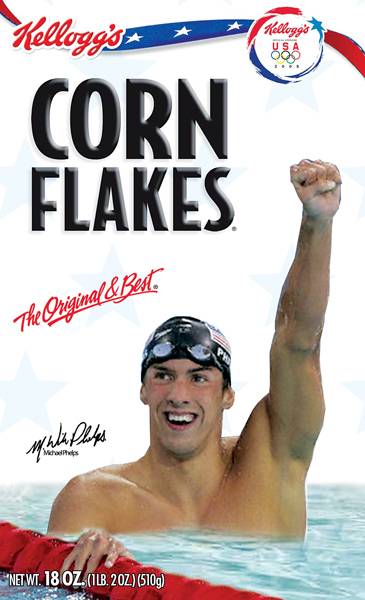OPOIEN: Phelps may be bad influence, but not for the reason claimed

This file photo provided Kellogg Co., shows a prototype of a box of Kellogg’s Corn Flakes featuring U.S. swimming star Michael Phelps. Bursting with indignation, legions of marijuana advocates are urging a boycott of Kellogg Co., including all of its popular munchies, for deciding to cut ties with Olympic hero Michael Phelps after he was photographed holding a marijuana bong. Photo: Kellogg Co./Associated Press
February 12, 2009
What happens when a fourteen-time Olympic gold medalist (not to mention two bronzes) gets caught up close and personal with a water bong? Well, for one, headlines containing variations of “Put that in your pipe and smoke it” abound. But what are the more serious implications?
The better question, in the fallout of “Phelpsgate” — the controversy created after an image of Olympic swimmer Michael Phelps smoking marijuana was released — is, are there any serious implications? At first glance, this is a big deal. But in the grand scope of society’s problems, does this Olympian’s misstep really merit the attention it has garnered?
If I had somehow managed to miss the headlines plastered all over newspapers, TV broadcasts, and Internet news services, I wouldn’t have stayed in the dark for long. The subject of Phelps’s bong hit came up in classes, discussions with friends, the Daily newsroom, and eventually in our editorial board meeting.
In every arena, the discussions held one thing in common: no consensus on a group opinion could be reached.
No one knows quite how to handle the fact that Michael Phelps, the American golden boy, went to a college party and smoked some pot. There’s the argument that the guy is 23 years old, and we need to cut him some slack for experimenting like any normal young adult is inclined to do.
However, there is also a significant voice from the people who feel that Phelps’s status as a role model and a representative of our nation makes him exempt from any leeway that might be granted to the average 23-year-old. An example can be taken from Olympic figure skater Apollo Anton Ohno, who said that after winning a gold medal at the age of 19, “My outlook on my behavior changed dramatically … it is important to represent what you would like your mom to see or a little kid to see.”
The fact that all of Phelps’s sponsors, with the exception of Kellogg’s, have remained loyal to him, indicates a general shift in society’s attitude toward marijuana use. Although choosing not to drop sponsorship doesn’t send the message that smoking pot is OK, it also doesn’t send a harsh signal of condemnation.
Similarly, USA Swimming’s punishment for Phelps is more of an action for the sake of public perception than an actual chastisement. They’re not saying it’s OK that he did it — in fact, they are verbalizing the opposite. However, by suspending him from competition for three months — effective immediately — they are essentially putting him in time-out. Not being able to swim in the next few competitions is like not being able to go to the movies with his friends, but being ungrounded in time for the big dance. The dance, in this case, being the 2012 London Games, in which he has not yet decided if he will compete.
All of the aforementioned is being heavily discussed and debated thanks to extensive news coverage. It’s true that Phelps has done something inexcusable, and not enough attention has been placed on the misdeed.
But I’m not talking about the weed.
In 2004, Phelps was sentenced to 18 months probation after pleading guilty to drunken driving. He was 19 at the time — although his records were expunged as a result of cooperation with probation. In addition to that deal, acceptance of probation meant that no charges of underage drinking, driving un der the influence, and failure to stop at a stop sign stuck with him. Of the dropped charges, Maryland State’s Attorney Davis Ruark said, “It’s not out of line with other first-time offenders who blow .08 in Wicomico County.”
I’m all for giving second chances. As college students, we should all understand that there are a world of mistakes to be made that can be written off as youthful ignorance. But we should also be aware that the media frenzy surrounding Phelps’s weed-smoking party antics is much more extensive than the coverage of his DUI arrest.
There’s something wrong here.
The argument against Phelps’s puff of pot is that he is a role model. This is true. But if he’s a figure to be looked up to, shouldn’t we be more worried about his DUI arrest?
Smoking marijuana, while illegal, directly affects one person — the one who inhales. Driving under the influence of alcohol endangers the lives of passengers — and yes, Phelps had passengers — and everyone else on the road. The implications of such a crime are much further-reaching. If we are going to criticize Phelps’s marijuana use based on his status as a role model, we must chastise him for his more dangerous offenses as well.
Why does the media care more about a puff of smoke than a life-threatening decision? This is the real question posed by this fiasco. Priorities and judgments must be reexamined.
— Jessica Opoien is a freshman in pre-journalism and mass communication from Marinette, Wisc.
















